Spear of Macragge Read online
Page 7
The presence of the fighters was disconcerting. The Ultramarines had not encountered forces such as these before on Damnos. As he tried to chase one down through his targeter, Iulus wondered what else was in the necron arsenal, lurking below the ice.
Scythe-edged and menacing, one of the fighters broke off from its attack pattern and dived towards Infirmary Seven where Iulus had sent Kolpeck. With a burst from its guns, the necron tore the makeshift field hospital open and exposed its wounded to the elements and its further wrath.
Leaping from the wall, Iulus split rockcrete as he landed. Ignoring the gibbering bodies thronging the courtyard, he raced for the infirmary. Kolpeck had saved his life during the siege; he was not about to allow that debt to go unpaid by letting the man die in ignominy.
Having seen their sergeant so driven, Aristaeus and Venkelius joined him from the lower battlements.
‘Brothers,’ Iulus told them as they ran across the courtyard, careful to avoid the fear-gripped Damnosians, ‘they will be afraid, and almost certainly not themselves. Try not to kill them.’
Both Ultramarines nodded to their sergeant.
Upon reaching the terrified guards still manning their posts at the infirmary entrance, Aristaeus stepped up and subdued the men with two swift blows from the pommel of his gladius.
‘Like that?’ he asked.
‘There’ll be more inside,’ Iulus warned them both, ‘and in much closer confines. Put your weapons away.’
Aristaeus had his flamer, whilst Venkelius carried a missile launcher slung across his back. Both warriors had their standard bolt pistol sidearm and Ultramarian gladius.
‘And hold on to them,’ added Iulus, once all three had secured their arms. ‘Last thing we need in there is someone drawing your blade in the chaos.’
Iulus opened the infirmary gate with a hard kick. As they stepped inside, a hellish vista greeted them. Even the darkness could not hide what had become of the hundreds hiding within. Bloodied, wailing, clad in scraps and scuttling like beasts; the infirmary had become more of an asylum, and one in which the inmates were running amok.
Several were dead already, their bodies slumped and pooling blood. Skirmishes had broken out in places, whilst some of the victims turned their terror-fuelled anger against shadows or the inanimate. Fear-sweat drenched the air. Iulus detected heavy concentrations of epinephrine, norepinephrine and adrenaline secreted by the victims and expressed through the Damnosians’ autonomic responses. The heady chemical cocktail merged with the stench of recently spilled blood, exacerbating the terror felt by those inside the infirmary.
‘This is no hospital,’ growled Aristaeus, unable to suppress his combat instincts. ‘It’s a war zone.’ He slid a finger’s width of gladius blade out of the sheath before Iulus’s voice stopped him going any further.
‘No weapons,’ he stated firmly.
‘Hand-to-hand then…’ uttered Venkelius, nodding to a group of manic-looking Damnosians who had reacted to the Ultramarines’ sudden presence.
‘And no killing,’ added Iulus as an orderly came at him with a surgical saw. Emitting a low grunt, he backhanded the man gently enough so as not to kill him, but still sent him sprawling.
Aristaeus deflected an IV frame swung at him by another, the metal bending around his armoured forearm before he planted the flat of his palm into his aggressor’s chest, flooring him.
Venkelius broke the arm of a third, a woman, using a deft elbow strike to shatter the bone.
‘Battle-brother!’ Iulus warned the heavy weapon trooper.
The woman had collapsed into a heap, clutching her broken limb.
‘She’s not dead, sergeant,’ Venkelius answered, mildly apologetic.
Iulus glanced sharply in his direction. ‘Pull your punches.’
Dispatching a second round of attackers, the humans so mindless with terror that they hurled themselves at them, the three Ultramarines advanced through the masses. When faced with the giant warriors, most of the Damnosians balked and fled. Others collapsed in foetal despair, willing the nightmare to be over. Iulus did not know what these poor wretches were seeing but if it kept them at bay he was not about to question it. Only the worst affected attacked, and these fools the Ultramarines dealt with swiftly, but not lethally.
As he fought, Iulus scanned the crowd for Kolpeck. He had locked the man’s image in his mind and would know it immediately.
‘There!’ he shouted to his comrades, who had spread out to cover more ground and subdue more of the truly insane. Iulus pointed to a nearby bunk surrounded by a clutch of blade-wielding men and women. At the heart of it was Kolpeck, an unconscious woman next to him. He was trying to protect her, roaring his defiance at the homicidal figures closing their net of sharp steel.
Ignoring his own orders, Iulus drew his bolt pistol and discharged an explosive round into the air.
The pistol report resounded in the infirmary, despite the terror-dirge. Several Damnosians in his path turned at the sound.
‘Step aside!’ Iulus bellowed, and the majority ran. Any stupid enough to stay were battered by the charging Ultramarine. He was just a few metres away. Out the corner of his eye, Iulus caught sight of Aristaeus and Venkelius converging on him. He also noticed the gaping hole in the side of the infirmary, and heard the necron fighter descending in front of it before he saw it.
Despite Kolpeck’s imminent peril, Iulus stopped and crouched, aiming at the cleft in the wall.
‘Venkelius,’ he said over the vox.
The heavy weapon trooper was also on one knee, bracing his missile launcher on his shoulder. Knowing his flamer was of little use, Aristaeus kept his brother free of interference.
With his warriors now in position, Iulus thought back to that advantage he had sought. The sickle-edge of the necron fighter came into view. It was moving slowly, hovering to get a better shot, and believing there was no threat inside the infirmary.
Iulus smiled when he saw the pilot’s glowing eyes.
‘Surprise…’ he murmured.
Pilot had broken off from his twin, enacting annihilation protocols extracted from his datastacks. One would distract, whilst the other would reap the maximum damage, both biological and structural. Pilot had reviewed and theoretically tested all potential tactics and had determined that splitting the ships was the most effective.
Though he did not understand or possess the capacity to appreciate the psychological effects of terror, Pilot could determine the logic path to this form of attack and the reduction in the overall combat efficacy of an entrenched enemy because of it. Based on experiential data contained within the stacks, he knew it would increase the success ratio of further attacks and that there was a direct and statistically significant correlation between terror attacks and the eventual capitulation of an enemy force.
The punitive tesla arc he had unleashed against the structure, thus making it more vulnerable, was therefore not only logical but also the most effective course of action his android brain would allow him to take.
Decreasing propulsion, Pilot brought his flyer into a descent pattern that would place all effective weapons within lethal range of the biological matter inside the ruined structure. He calculated he had time for a single salvo before a further delay would breach acceptable threat parameters. A data stream indicated his primary weapon was the pre-eminent choice in this scenario.
Pilot engaged the death ray’s capacitors, fed energy into its power coils so that by the time he had the optimum shot it would be fire-ready. But as his targeting matrices locked on the focus of his beam, new data cascaded over the old. Threat parameters dramatically increased, warning Pilot that additional, un-factored variables had suddenly intruded on the balanced equation he had just made.
Processing the appropriate responses in nanoseconds, Pilot took evasive action as explosive fire raked over the hull of his craft. It achieved no lasting damage, and it was only then, as another data stream describing an incoming incendiary washed over his visual
feed, that Pilot ascertained the first attack had been a feint and this second attack was the one intended to destroy him.
Pilot had enough time to realise his miscalculation, to see his inevitable doom relayed in streams of unfeeling, undeniable logic, before the missile struck the coruscating tip of the death ray and tore him and his scythed craft apart.
Iulus clenched a fist as the necron flyer exploded. Venkelius had shot well, and would be recommended for battle honour. Mercifully, no other casualties were caused by the flyer’s destruction. Well acquainted by now with necron tactics, Aristaeus was already rushing over to the burning wreck but the necron inside was gone, phased out from irreparable damage.
The flamer trooper turned to the others, giving the all clear.
Through the gap in the wall, the Thunderstorm streaked past on screaming turbofans, engines flaring. Just before the gunship disappeared from sight again, Iulus saw it discharge a missile payload at a target beyond his limited field of vision through the ruined wall and knew it was engaging the second flyer. With the destruction of his wingman, Iulus assumed the surviving craft would disengage. That assumption was borne out as, slowly, the terror-dirge receded and with its abeyance some semblance of composure returned. The chill of fear lingered still in its wake, but the men and women of the infirmary were beginning to come around. Some blinked, as if waking from a terrible dream; others wept, appalled at what they had done or still coming to terms with the remembered nightmares of the past.
It was raw, the atmosphere choked with grief and regret, but at least it was sane.
Iulus reached Kolpeck at last. The man was slow to come down from his heightened emotional state, and he battered at the Ultramarine at first, hammering impotently at the warrior’s chest with his fists.
‘Stand down, Sergeant Kolpeck,’ Iulus told him, holding the man to his chest, holding him steady and firmly. ‘Stand down.’
Like some of his fellow Damnosians, Kolpeck blinked – there were tears in his eyes, not of fear or sorrow but defiance – and looked up at his saviour.
‘Brother-Angel,’ he said, voice choked with emotion. ‘Is she…?’ Iulus released him and Falka Kolpeck began to turn around.
‘She’s alive, trooper,’ Iulus told him, nodding to the prone woman on the bed whom Kolpeck had been protecting.
Now the tears really began to flow, of relief, of hope, of desperation.
‘Thank the Emperor…’ said Kolpeck.
Iulus did not stay to watch. He summoned Venkelius and Aristaeus, and the three of them went back out into Kellenport to see what was left of the city defences and, more importantly, the resolve of its defenders.
Iulus placed little hope in the continued endurance of either.
CHAPTER EIGHT
BROKEN SWORD
With a grunt of effort, Scipio dragged himself out of the snow-choked hold of the Gladius. From a cursory look, the gunship appeared to be largely intact, although it had been badly raked where its hull had connected with the sides of the canyon and a large section of wing including most of the right-hand side was buried under churned ice and snow.
They had crash-landed in a rocky valley, the surrounding crags and slab-sided boulders edged with frost. In the middle distance as he rapidly surveilled the area, Scipio noticed a nest of caves. A ridge of ice-rimed stone led to the lowest mouth, which was large enough to accommodate an entire armoured column. Drifts were still descending, not as heavy as before, but swathing any tracks friendly or enemy that might recently have been formed in the snow underfoot. To the naked eye it would appear virginal, but Scipio detected heat traces and the oily remnants of fuel thronging the ice-crisp breeze. Something had passed through this way, but he could detect no further sign of it beyond these lingering spoors.
Satisfied they were not about to be attacked, he plunged a gauntleted hand into the hold and hauled out Garrik.
‘We alive, brother-sergeant?’ asked the heavy weapons trooper. He was still clinging to his launcher, thick clumps of hard-packed snow disintegrating off his body as the heat from his power armour melted it.
‘Only in death, brother,’ Scipio replied, returning to his surveilling. ‘You know that.’
‘Duty it is then.’
‘Hold here. I want to recon our position.’
Garrik nodded, before going to dig out the rest of the squad so Scipio could scout further out.
First impressions were that the crash site was deserted. That was both good and bad. Good because it meant an attack was highly unlikely, as in their current disposition that could prove terminal. Bad because help would not be forthcoming or easy to summon.
High cliffs on either side shielded the valley basin from the worst of the elements. It was largely barren, with the caves rising up to enclose the south-facing aspect, and the jagged path that had led them to this point heading off towards the north. As Scipio scouted past the fifty-metre mark, he realised they must have travelled some distance. He could see all the way to the edge of the valley mouth, but even through the scopes there was no evidence of the battlefield they had left behind or Chronus’s tanks. If they were in retreat, or worse, destroyed, there was no way of knowing.
Scipio recalled the shadow under the ice just before the flash of light signalling the massed necron phase shift. Guilliman’s blood, it had been so sudden: a vast and immediate spike of teleportation that had caught the Ultramarines forces totally unaware. But that was not what had first alerted him to the danger. Chronus was caught between two enemy formations, one above the ice; one below it. Even the vaunted tank commander would struggle to overcome such odds. Just as Scipio had suspected, the necrons were far from defeated. They were not even diminished in their military efficacy – they had merely been dormant, and now they were waking up.
He tried the vox, hoping to contact one of the vehicles in the tank commander’s company, but got only static in reply. According to his retinal display, all vox-frequencies were down. Scipio guessed environmental interference was the cause. They would need to gain higher ground, and try again without obstruction. With sheer cliffs on either side, that made the caves their best hope of reaching a high enough vantage to get a signal.
Largo joined him beyond the fifty-metre perimeter. This was surprising, as he had been expecting his second-in-command.
‘Where is Brother Brakkius?’ Scipio asked.
‘Injured, brother-sergeant. During the crash, his legs were crushed. He can’t walk.’
That was a blow. Scipio relied on Brakkius’s counsel and experience.
‘Any other injuries?’
‘Brother Kastus is incapacitated. The Gladius’s prow bore the brunt of the impact. The glacis was shattered instantly, and it took some hits.’
Scipio met Largo’s gaze. ‘Is he dead?’
‘Sus-anic coma, brother-sergeant.’
‘At least that’s something,’ Scipio conceded. With both Brakkius and Kastus out of action, that limited their options. A march into the wastes was out of the question. ‘What about the ship?’
‘The prow is more or less intact but our Techmarine holds it must be repaired if we’re to get airborne again.’
‘Airborne?’ Scipio asked quizzically. ‘I assumed we were grounded.’
A voice a little farther away answered, the unmistakable mechanical cadence of Vantor.
‘The machine-spirit of the Gladius yet lives,’ said the Techmarine. ‘I can not only repair, I can also fly it in Kastus’s absence.’
‘How long do you need?’ asked Scipio.
‘Most of the damage is superficial. There is a split in the port-side wing that must be fixed, the prow you already know about. I’ll need to run a thorough diagnostic too…’
‘How long?’ the sergeant pressed, quickly tiring of Vantor’s loquaciousness when discussing mechanics.
‘I estimate an hour.’
Scipio shook his head ruefully. ‘Chronus could be dead in an hour. We need to send a message to Kellenport, and raise the ta
nk commander if we can. He might be in need of reinforcement.’ He turned back to Largo. ‘Gather the rest of the squad. We’re going on a scouting mission.’
‘What of Brakkius, brother-sergeant?’
‘He stays with Vantor. Now go.’
Looking back in the direction of the crash site, Scipio could see that most of Squad Vorolanus was ready for deployment. Only Brakkius, currently laid up against the unburied side of the Gladius’s hull, would be absent.
‘We’ll be heading towards the caves,’ Scipio told the Techmarine. ‘Make sure the gunship is flight-worthy by the time we return.’
Vantor nodded. ‘Be wary, brother-sergeant. I have never seen such ingenuity and resilience in a foe before as I have with the necrons.’
Scipio looked askance at the Techmarine. ‘I think I am starting to agree with Brakkius.’
‘How so?’
‘You sound like you admire these creatures.’
‘As I said to him, it is merely fascination. But also respect. They are devious and possess technology about which we know almost nothing. They are deadly, Sergeant Vorolanus.’
Scipio said nothing, and returned to the downed gunship to gather his squad.
CHAPTER NINE
ARMOUR KILLS
The Honour of Calgar was ablaze. Tongues of fire lapped eagerly across its scorched hull, its crew trapped inside and without hope of rescue. They did not try to escape. They were sons of Guilliman. They kept fighting. It burned for another eight seconds, floundering blindly, sponson guns chugging, before its fuel and ammunition cooked off and the Predator exploded. The shrapnel struck a second battle tank, Hera’s Banner, which was mired in ice. Half its hull was sunk beneath the permafrost, tracks whirring but skidding badly and failing to find purchase. Unable to defend itself, Hera could only await the inevitable as an arachnid necron construct clambered over its roof and gutted it from close range with a heat ray. Metal sloughed to molten slag under the weapon’s angry glow, the incumbent crew likewise. Within a few seconds, Hera was no more. It did not even resemble the proud war machine it had once been. ‘Scrap’ would have been too kind a term for it.

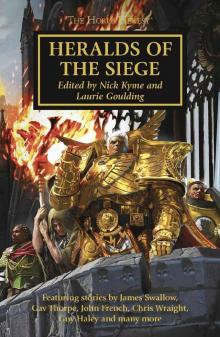 Heralds of the Siege
Heralds of the Siege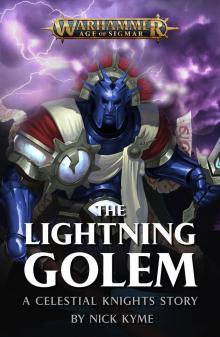 The Lightning Golem
The Lightning Golem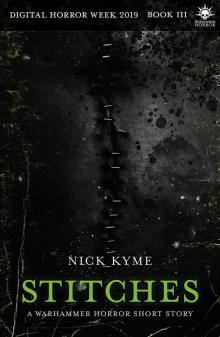 Stitches
Stitches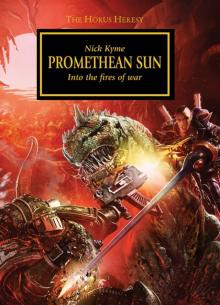 Promethean Sun
Promethean Sun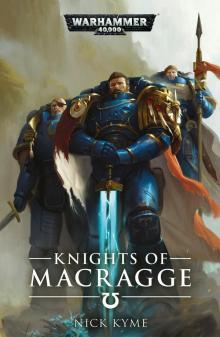 KNIGHTS OF MACRAGGE
KNIGHTS OF MACRAGGE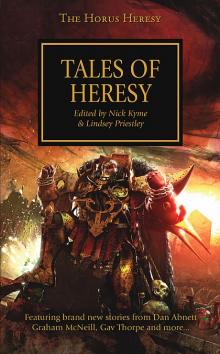 Tales of Heresy
Tales of Heresy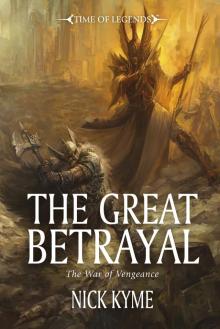 The Great Betrayal
The Great Betrayal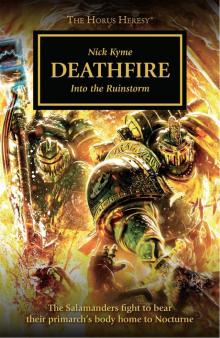 Deathfire
Deathfire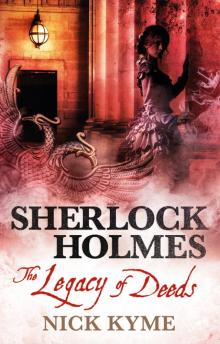 Sherlock Holmes--The Legacy of Deeds
Sherlock Holmes--The Legacy of Deeds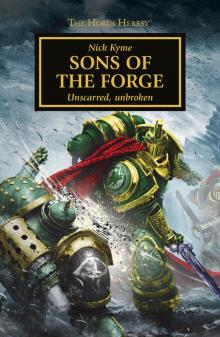 Sons of the Forge
Sons of the Forge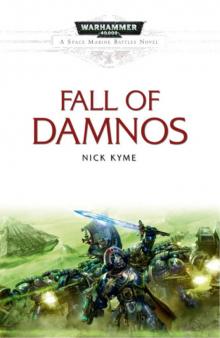 Fall of Damnos
Fall of Damnos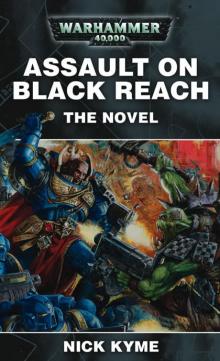 Assault on Black Reach: The Novel
Assault on Black Reach: The Novel![[Horus Heresy 10] - Tales of Heresy Read online](http://i1.bookreadfree.com/i/03/27/horus_heresy_10_-_tales_of_heresy_preview.jpg) [Horus Heresy 10] - Tales of Heresy
[Horus Heresy 10] - Tales of Heresy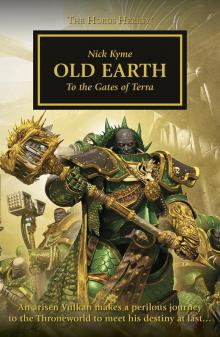 Old Earth
Old Earth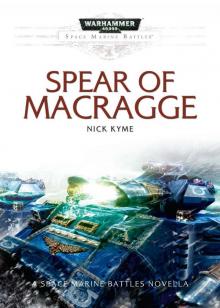 Spear of Macragge
Spear of Macragge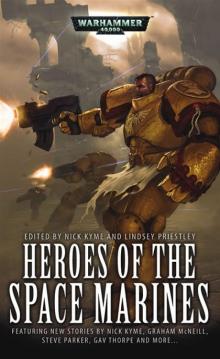 Heroes of the Space Marines
Heroes of the Space Marines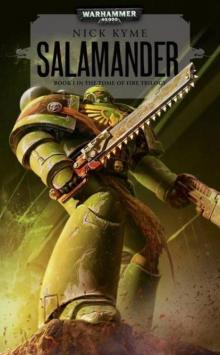 Salamander (warhammer 40000)
Salamander (warhammer 40000)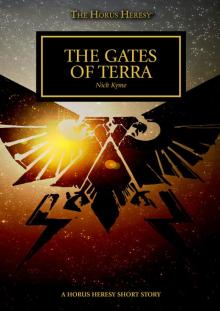 The Gates of Terra
The Gates of Terra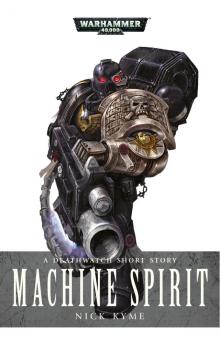 Machine Spirit
Machine Spirit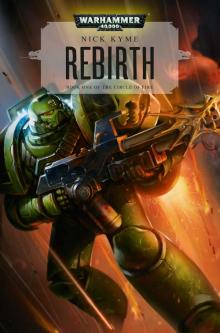 Salamanders: Rebirth
Salamanders: Rebirth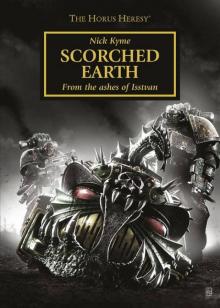 Scorched Earth
Scorched Earth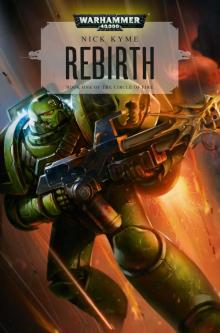 Rebirth
Rebirth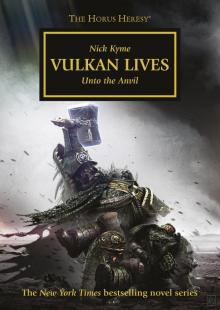 Vulkan Lives
Vulkan Lives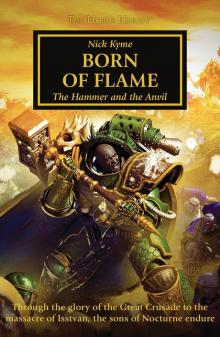 Born of Flame
Born of Flame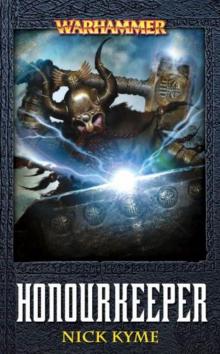 Honourkeeper
Honourkeeper